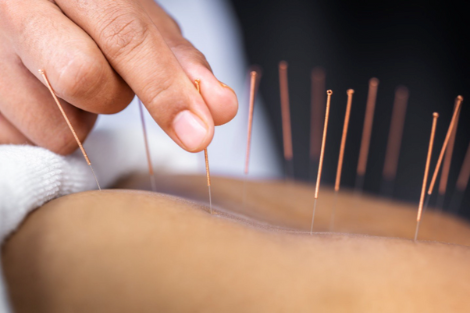How Does Acupuncture Work
Exploring Its Benefits for Pain Relief, Stress Reduction, and Overall Wellness
Acupuncture is an ancient practice that many seek for relief from various ailments. This holistic approach stimulates specific points in the body to activate natural healing mechanisms and promote overall wellness. Understanding how this therapy works can empower you to make informed decisions about your health.
People frequently turn to acupuncture for pain management. By targeting specific points, acupuncture aims to alleviate discomfort associated with conditions such as back pain, arthritis, and migraines. This method has gained recognition for its potential effectiveness in decreasing pain without the side effects often associated with medication.
Another common reason for seeking acupuncture is stress reduction. By promoting relaxation and balancing energy within the body, acupuncture can help you manage stress and anxiety. Many find that this treatment not only enhances their emotional well-being but also improves sleep quality, contributing to a more balanced lifestyle.
The Science Behind Acupuncture
Acupuncture operates on multifaceted principles, including the concept of Qi, its neurological underpinnings, and the specific points manipulated during treatment. Understanding these components can enhance your awareness of how acupuncture interacts with your body.
Understanding Qi and Energy Pathways
In traditional Chinese medicine, Qi (pronounced "chee") represents the vital energy flowing through your body. It is believed to travel along pathways known as meridians. When the flow of Qi is disrupted, it can lead to illness or discomfort.
Practitioners locate over 2,000 acupuncture points along these meridians. By stimulating these points, you can restore balance and facilitate smoother energy flow. In doing so, acupuncture aims to alleviate symptoms and enhance overall well-being.
Neurological Basis for Acupuncture
Modern research has begun to explore the neurological mechanisms behind acupuncture. Studies suggest that acupuncture can influence your nervous system, potentially altering pain perception and emotional responses.
When needles are inserted, they may stimulate sensory neurons, triggering the release of neurotransmitters like endorphins. This process can lead to pain relief and feelings of relaxation. Imaging techniques in clinical trials have shown changes in brain activity, reinforcing the connection between acupuncture and neurological responses.
Acupuncture Points and Body Responses
Each acupuncture point corresponds to specific organ systems and bodily functions. The manipulation of these points can elicit varied responses in your body.
For example, certain points are known to affect digestion, while others may help alleviate headaches or reduce anxiety. By addressing these points, practitioners aim to influence bodily functions and promote healing. Understanding the relationship between acupuncture points and their corresponding effects can empower you to make informed choices about your treatment.
Acupuncture for Pain Relief
Acupuncture is a widely recognized treatment for pain relief, addressing various types of pain including chronic conditions, acute injuries, and specific types of headaches. Understanding how acupuncture works in these contexts can help you assess its potential benefits for your situation.
Chronic Pain Management
Chronic pain affects millions, including conditions like arthritis and fibromyalgia. Acupuncture can be particularly effective in managing this pain by targeting specific points on the body that correspond to pain pathways.
Research indicates that the insertion of needles may stimulate the release of endorphins, which act as natural painkillers. Additionally, acupuncture is believed to improve blood flow to the affected areas, promoting healing and reducing inflammation.
Regular treatment may lead to a significant reduction in pain levels, enhancing your overall quality of life. Many find that acupuncture provides a complementary approach to conventional pain management techniques.
Acute Pain and Injury Recovery
When dealing with acute pain from injuries, such as sprains or strains, acupuncture can facilitate faster recovery. It works by addressing both the pain and the underlying inflammation.
The needles inserted during an acupuncture session can help increase circulation to the injured area. This promotes healing and reduces stiffness, which can be crucial in the recovery process.
Moreover, acupuncture may help decrease muscle tension, which often accompanies acute injuries. This dual approach allows for quicker mobility restoration and pain alleviation, allowing you to return to your normal activities sooner.
Headache and Migraine Treatment
Acupuncture has been recognized for its effectiveness in treating headaches and migraines. Many individuals suffering from these conditions seek acupuncture as a means of relief.
It is thought that acupuncture can reduce the frequency and intensity of headaches by targeting specific points that influence the nervous system. This may help regulate neurotransmitters and hormones that affect pain perception.
Patients often report experiencing fewer migraines and a decrease in headache symptoms after consistent treatment. Integrating acupuncture into your routine could offer a non-pharmaceutical option for managing headaches and enhancing overall well-being.
Acupuncture for Stress and Anxiety
Acupuncture serves as a valuable tool for managing stress and anxiety by promoting relaxation and supporting emotional balance. By stimulating specific points on the body, acupuncture can influence your nervous system, enhance your well-being, and improve overall sleep quality.
Calming the Nervous System
Acupuncture helps to calm the nervous system by activating the parasympathetic response. This response encourages relaxation by reducing the production of stress hormones like cortisol.
The needles stimulate specific acupuncture points that signal your brain to release neurotransmitters such as serotonin and dopamine. These neurotransmitters are known for their mood-regulating properties, contributing to a sense of calm and well-being.
Patients often report feeling more centered and grounded, which can reduce feelings of anxiety. Regular sessions may equip you with tools to manage stress more effectively over time.
Enhancing Relaxation and Well-being
The relaxation induced by acupuncture extends beyond simple stress relief. It promotes a sense of overall well-being by bringing harmony to the body's energy systems.
By targeting specific meridians, acupuncture restores optimal energy flow, which contributes to both physical and emotional health. This holistic approach can lead to a greater sense of mental clarity and emotional resilience.
Many individuals find that acupuncture enhances their coping skills, allowing them to navigate daily stressors more effectively. Enhanced relaxation not only improves your mood but also increases your ability to face challenges without becoming overwhelmed.
Improving Sleep Quality
Quality sleep is crucial when addressing stress and anxiety. Acupuncture plays a key role in improving sleep patterns by addressing underlying issues that disrupt your rest.
Specific acupuncture points are known to promote better sleep by calming the mind and relaxing the body. This can help reduce insomnia and other sleep disturbances often linked to anxiety.
Patients frequently report falling asleep faster and experiencing deeper sleep after sessions. A consistent acupuncture routine can lead to improved overall sleep quality, making you more resilient to stressors in your daily life.
Acupuncture for Digestive Health
Acupuncture can be an effective approach for improving digestive health. It targets specific points on the body to enhance digestion, alleviate discomfort, and promote overall gut function.
Addressing Digestive Disorders
Many individuals seek acupuncture to address specific digestive disorders, such as irritable bowel syndrome (IBS), bloating, and constipation. Acupuncture points like Stomach 36 (ST36) play a crucial role in alleviating symptoms.
This point, located on the lower leg, is known to stimulate digestive functions. Research indicates that using acupuncture helps in balancing gut motility, reduces inflammation, and facilitates better communication between the gut and the brain. By targeting these specific points, you may experience relief from chronic digestive issues.
Supporting Gut Health
Acupuncture supports gut health by regulating the secretion of digestive enzymes and gastric juices. Improved secretion of these substances is essential for breaking down food and absorbing nutrients efficiently.
When acupuncture treatments stimulate specific points, they enhance blood flow to the digestive organs, promoting efficient digestion. Regular sessions can also help reduce stress, which is a significant contributor to digestive problems. By calming the nervous system, you can create a more conducive environment for your digestive system to function properly.
Boosting Metabolism
Improving metabolism is another benefit of acupuncture related to digestive health. The practice stimulates the body's energy pathways, helping to optimize metabolic processes.
Acupuncture can enhance your body's ability to process food and convert it into energy. This effect is particularly beneficial for individuals looking to maintain a healthy weight or those who struggle with energy levels. By incorporating acupuncture into your wellness routine, you may notice increased energy and improved overall vitality, linking digestion with metabolism effectively.
The Acupuncture Experience
Understanding the acupuncture experience can help you feel more prepared and relaxed. Here’s what you can expect during a session and essential post-treatment care tips.
What to Expect During a Session
As you arrive for your acupuncture treatment, you will discuss your health history and specific concerns with your practitioner. This consultation helps them tailor the treatment to your needs.
During the session, you will lie comfortably as the practitioner inserts very thin needles into specific points on your body. You might feel a slight prick, but many find the sensation minimal or even soothing.
Once the needles are in place, you may rest for about 20 to 30 minutes. During this time, some people experience a relaxing sensation, while others may feel a sense of warmth or heaviness in the area.
Post-Treatment Care and Recommendations
After your acupuncture session, it’s essential to take care of yourself to maximize benefits. You should remain hydrated, as this helps flush out toxins that may have been released during treatment.
Avoid strenuous activities for at least a few hours after your session. Your body needs time to integrate the changes initiated by acupuncture.
Some practitioners recommend gentle stretching or light walking to promote circulation. You may also want to keep track of how you feel over the next few days, noting any changes or improvements.
Following these guidelines can enhance your overall experience and support your healing journey.
Conclusion: Integrating Acupuncture into Your Health Regimen
Incorporating acupuncture into your health regimen can enhance your wellness journey. This practice not only targets physical ailments but also supports emotional and mental well-being.
Consider these key points for integration:
Personalized Treatment: Work with a licensed acupuncturist, like ours at Strive Holistic, to tailor the sessions to your specific health concerns.
Regular Sessions: Consistency can lead to better outcomes. Discuss with your practitioner to establish a suitable frequency.
Integrating this ancient practice into your routine supports both physical and mental health. You may find improved quality of life as you explore its benefits. Listening to your body and adjusting treatments as necessary is essential for long-term success.

